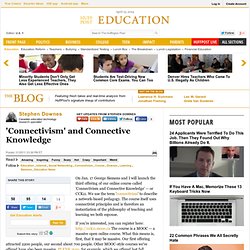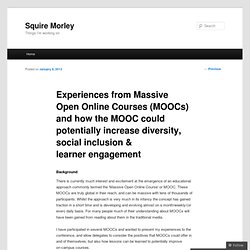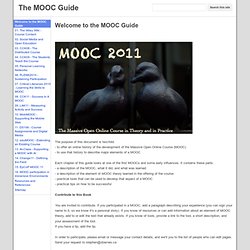

Stephen Downes: 'Connectivism' and Connective Knowledge. On Jan. 17 George Siemens and I will launch the third offering of our online course called 'Connectivism and Connective Knowledge' -- or CCK11.

We use the term 'connectivism' to describe a network-based pedagogy. The course itself uses connectivist principles and is therefore an instantiation of the philosophy of teaching and learning we both espouse. If you're interested, you can register here: The course is a MOOC -- a massive open online course. What this means is, first, that it may be massive. Our first offering attracted 2200 people, our second about 700 people. It also means, second, that the course is free and open. The way CCK11 is set up is that we've defined a twelve-week course of readings. What is important about a connectivist course, after all, is not the course content. Let me explain why we take this approach and what connectivism is. What we learn, what we know -- these are literally the connections we form between neurons as a result of experience. 1. 2. 3. 4. Experiences from Massive Open Online Courses (MOOCs) and how the MOOC could potentially increase diversity, social inclusion & learner engagement.
There is currently much interest and excitement at the emergence of an educational approach commonly termed the ‘Massive Open Online Course’ or MOOC.

These MOOCs are truly global in their reach, and can be massive with tens of thousands of participants. Whilst the approach is very much in its infancy the concept has gained traction in a short time and is developing and evolving almost on a month/weekly/(or even) daily basis. For many people much of their understanding about MOOCs will have been gained from reading about them in the traditional media.
I have participated in several MOOCs and wanted to present my experiences to the conference, and allow delegates to consider the positives that MOOCs could offer in and of themselves, but also how lessons can be learned to potentially improve on-campus courses. Depending on the type of MOOC there may be no prerequisites to participation. Fig. 1 Screenshot of the Stanford Artificial Intelligence MOOC webpage George Siemens cMOOCs How It Works, Www.immagic.com/eLibrary/ARCHIVES/GENERAL/CHRON_HE/C121001P.pdf.
The MOOC Guide. The purpose of this document is two-fold: - to offer an online history of the development of the Massive Open Online Course (MOOC) - to use that history to describe major elements of a MOOC Each chapter of this guide looks at one of the first MOOCs and some early influences.

It contains these parts: - a description of the MOOC, what it did, and what was learned - a description of the element of MOOC theory learned in the offering of the course - practical tools that can be used to develop that aspect of a MOOC - practical tips on how to be successful Contribute to this Book You are invited to contribute. If you participated in a MOOC, add a paragraph describing your experience (you can sign your name to it, so we know it's a personal story). In order to participate, please email or message your contact details, and we'll you to the list of people who can edit pages.